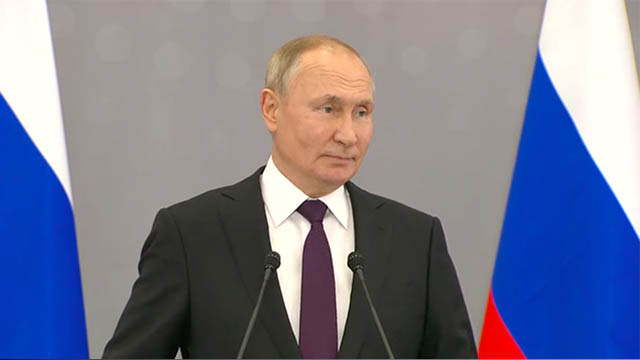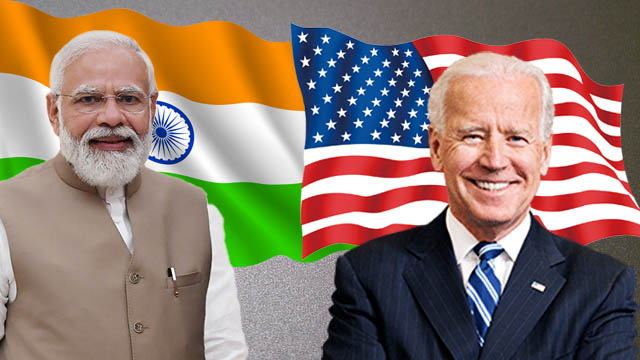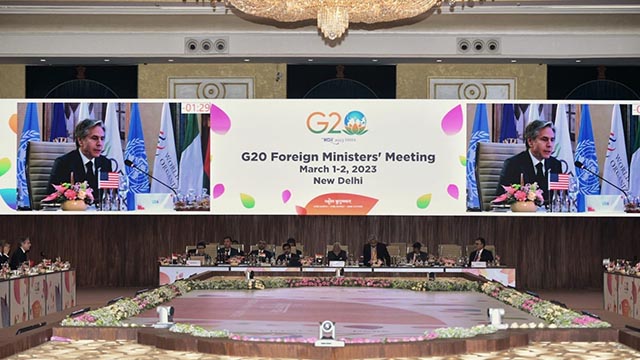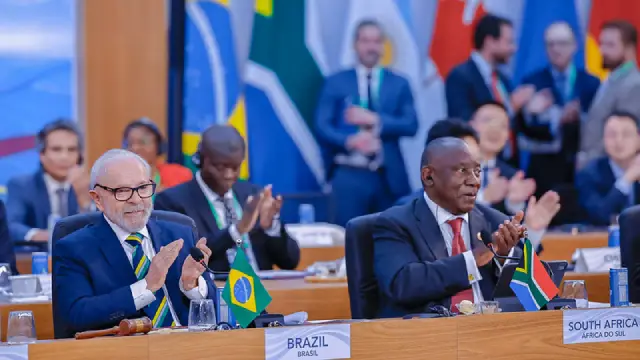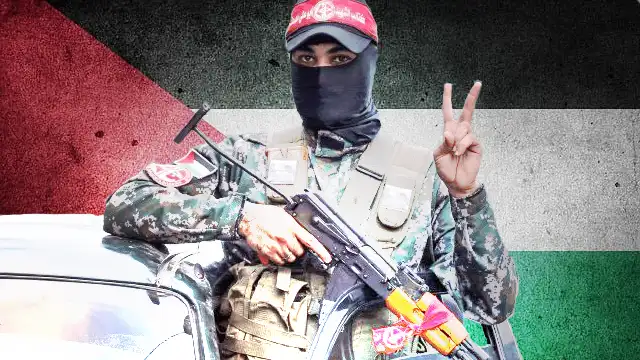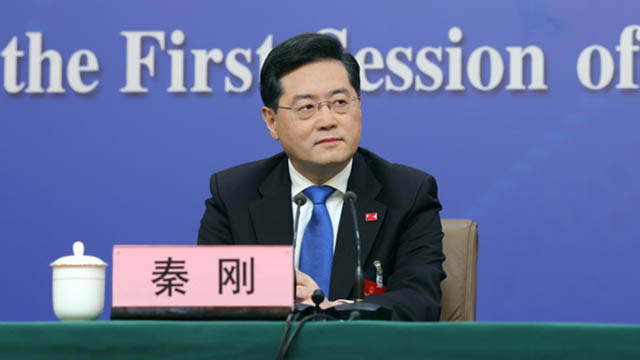When Russian President Vladimir Putin announced a special military operation in Ukraine on February 24th 2022, the US and the western powers imposed sanctions on Russia with the hope of crippling its economy. However, in a year, the sanctions on Russia have failed to meet their objective; rather, they backfired on the West.
China-Russia alliance strengthened
Although the US and other North Atlantic Treaty Organization (NATO) member states started vehemently opposing Russia since the beginning of its special military operations in Ukraine, their bloc didn’t receive any support from the countries of Asia, Africa and Latin America. Rather, new power alignments took place, which bolstered Russia’s position and enabled Putin’s government to escape the effects of the sanctions.
The US meddled in South Asia to counter China’s rise and hamper its economic growth, which suffered a setback due to the two-year-long Covid-19 pandemic. The US government’s attempts to stoke regional tension over Taiwan, which China considers an integral part of, violated Washington DC’s previous pledge to follow the ‘One China Policy’ and irked Beijing.
The Taiwan visits by the US House of Representatives Speaker Nancy Pelosi in August 2022 sparked tension between the US and China. Both sides started flexing their muscle at the Taiwan strait, which brought Beijing closer to Moscow.
Although Russia’s ties with China improved under President Xi Jinping, Beijing maintained a neutral position in the Ukraine war due to its trade interests in Ukraine and the European Union. However, the US actions in Taiwan paved the way to strengthen ties between China and Russia.
Joining Putin, China started advocating for a multipolar world order and demanded an end to the US-led hegemonistic regime. China also maintained that the US and NATO should stay away from Ukraine and stop meddling in other countries’ affairs.
Recently, Wang Yi, the director of the Communist Party of China’s (CPC) Central Committee’s Office of the Foreign Affairs Commission, visited Europe and met leaders, including French President Emmanuel Macron. Wang told Macron that China is ready to work with Russia to peacefully resolve the Ukraine crisis.
“China stands ready to cooperate with the international community, including France, to promote a path of political solution [for the conflict], and reach a ceasefire at an early date,” Wang reportedly told Macron.
Wang also met Putin in Moscow, and their meeting paved the way for Xi’s visit to Moscow later this year. Putin underscored the importance of stronger China-Russia ties for a multi-polar world order, further isolating the US and its western allies.
“Against this backdrop, cooperation between the People’s Republic of China and Russia in the global arena, as we have stressed on numerous occasions, is crucial for stabilising the international situation,” Putin said in a statement.
Putin told Wang that he expects Xi to visit Moscow soon. “We are expecting the president of the People’s Republic of China to visit Russia. We agreed on this earlier,” Putin reportedly told Wang.
The sanctions on Russia proved ineffective as China’s bilateral trade with Russia increased manifold during the last year. “China has reasserted itself as Russia’s largest trade partner, a status it has held for more than a decade, and it is playing an increasingly important role as a friendly nation in the current circumstances,” the Russian Foreign Ministry said in a statement.
The US dollar’s domination challenged
Both China and Russia have advocated bypassing the dollar-based international trade system, which is biased towards the US. The US sanctions on Russia have forced the latter to trade with other countries using its rouble. This strengthened the rouble price as demand increased in Asia, Africa and Latin America.
The rouble went down to 40% from its pre-war levels due to the sanctions imposed by the US and the European Union (EU) countries. The Russian currency hit a record low of 143 roubles to a dollar on March 7th 2022.
However, in late March 2022, Russia insisted that EU countries that buy natural gas from its state-owned Gazprom pay in Russian roubles. It offered lucrative deals for buyers who would pay in Russian roubles. This strategy paid great dividends to Moscow, as the Russian currency recovered to 85 roubles to a dollar by March 31st 2022, close to its pre-war levels.
By May 2022, the Russian rouble became 30% higher than the US dollar. By June 23rd 2022, the Russian rouble hit its record high of 52.3 a dollar, the highest in seven years. This even panicked the Russian central bank, forcing the latter to weaken the currency to ensure its exports remain competitive.
In December 2022, the Russian rouble slumped against the dollar but remained at its pre-war level. On December 27th, the rouble fell to 71.36 a dollar. The rouble further fell to a 10-month low past 75 to a dollar. Although the US expected this to weaken Russia’s economy, it didn’t happen. By February 17th, the Russian currency started recovering itself, and it’s expected to become stronger by the end of the month.
New bilateral equations against the backdrop of sanctions on Russia
Neither Ukraine nor the US could win new allies during the last year, except for Sweden and Finland decided to join NATO. Rather, the US’s global hegemony has faced severe challenges, and its domination has been waning over several geographies.
India has been one of the foremost US allies in South Asia and enjoys a special status among all allies of Washington DC. Under former president Donald Trump, the US government brought the Countering America’s Adversaries Through Sanctions Act (CAATSA) in 2017 to effectively bar any ‘significant transactions’ with Russia’s defence industry. India received an exemption for its purchase of S-400 air defence missiles from Russia.
However, Russia’s special military operation in Ukraine has opened a new horizon of opportunities for India, which strengthened its bilateral ties with Russia ignoring US warnings. Prime Minister Narendra Modi’s government seized the opportunity to increase the import of Russian oil at a lucrative price.
While India imported 25,000 barrels of oil daily at the beginning of 2022, which was 0.2% of its total crude oil imports, the volume increased to 600,000 barrels by May-June 2022, ie, nearly 10% of its daily purchase. It became impossible for India and Russia to trade using US dollars after the sanctions on Russia were imposed.
Therefore, India discussed the viability of returning to the Soviet-era rupee-rouble arrangement to pay for the Russian oil. However, both parties settled for a rupee payment to avoid inconveniences for India.
India refrained from voting against Russia in the United Nations (UN). Whenever the US and the western powers brought resolutions against Russia, Indian delegates abstained from voting. India also refrained from strongly criticising Moscow for the Ukraine conflict.
However, in November 2022, defying the US diktats, India voted in favour of a Russian draft resolution—Combating glorification of Nazism— in the UN. This also irked the US and the western powers, as Russia has accused the West of promoting and nurturing neo-Nazi forces throughout Europe, especially in Ukraine.
Saudi Arabia and the UAE have been loyal allies of the US in the Middle East. However, since Russia’s special military operations in Ukraine began, the Arab monarchs have changed their loyalty. It has been alleged that under Russian influence, the monarchs of Saudi Arabia and the UAE refused to take calls from US President Joe Biden in March 2022.
Traditional allies of Russia like Iran and Syria and several central Asian former Soviet republics have retained their strategic ties with Russia. Many former Soviet republics, including Byelorussia, Armenia and Turkmenistan, look forward to Russia’s support in view of regional security threats. The US has been accusing Iran of supplying drones to Russia, which has changed the hitherto pattern of supply of weapons from advanced countries to developing countries.
Due to the sheer Islamophobic nature of the Ukrainian neo-Nazis, most Arabs support the Russian position. Moreover, they oppose the US-led West’s hypocrisy over “aggression”. They accuse the West of being mute over the Israeli occupation and violence in Palestine, while they amplify their hue and cry during Russia’s special military operation in Ukraine.
Except for Japan and Singapore, which unequivocally condemned the Russian special military operation in Ukraine as “aggression”, other Asian countries like India, Bangladesh, Indonesia, Vietnam, Laos, Cambodia, Philippines, Malaysia, etc, retained a neutral position and declined the West’s proposal to boycott Russia diplomatically. This bolstered Russia’s position in the world’s largest continent.
The US and its western allies faced stiff defiance from many Latin American countries like Bolivia, Cuba, Nicaragua, and Venezuela. Even though the diplomats of Brazil and Mexico opposed Russia’s special military operation in Ukraine, the governments of these countries didn’t support the sanctions on Russia.
The US proposed to send advanced weapons to Latin American countries if they handed over their Soviet-era weapons to Ukraine. The Latin American countries rejected the proposal. Colombia’s left-wing president Gustavo Petro reportedly said, “Even if they end as scrap in Colombia, we will not hand over Russian weapons to be taken to Ukraine to prolong a war.” Petro said, “We are not on either side. We are for peace.”
Africa has largely favoured vis-à-vis the West in the Ukraine conflict. Most African countries have been experiencing a resurgence of anti-West sentiments recently, especially after the NATO aggression toppled Libya’s government.
Despite Ukrainian Foreign Minister Dmytro Kuleba’s Africa tour in October 2022, 19 African countries abstained from voting in a UN General Assembly resolution condemning Russia’s special military operation in Ukraine.
Burkina Faso, Cameroon, Equatorial Guinea, and Sao Tome were absent from the assembly. Mali, the Central African Republic, Ethiopia, the Republic of Congo, South Africa, Sudan, Uganda and Zimbabwe abstained from voting. Eritrea had also abstained from voting.
How have the sanctions on Russia paid off so far?
The sanctions on Russia failed to meet the expectations of the West. At the beginning of Russia’s special military operation in Ukraine, the West had estimated that their sanctions would cripple the Russian economy and force Putin to negotiate an exit deal with NATO on Ukraine. However, the events of the past year prove the opposite.
Not only have the sanctions on Russia failed to prevent its military advances, but the Russian economy has fared relatively better due to windfall gains from Gazprom’s energy exports. Moreover, the sanctions on Russia, the West’s reliance on US gas, and the Nord Stream 2 pipeline blast, for which Russia has accused NATO, resulted in excessive inflation in Europe, causing many households in countries like the UK to cut down their monthly expenses.
As more western powers are committing financial and military aid to Ukraine, turning it into a virtual battleground between the US-led NATO and Russia, the more their economies are facing the brunt. This has been intensifying socio-political tensions, while both far-right and far-left forces are seizing the opportunity to polarise the common people against their governments.
On Saturday, February 25th, a large rally occurred in the German capital Berlin. It was organised by Sahra Wagenknecht-led socialist Left Party. The rally called for “peace in Ukraine” and demanded an immediate termination of western military aid to Ukraine that they claimed has been prolonging the violence. Wagenknecht’s rally, criticised by German conservatives as “Russian propaganda”, managed to mobilise over 50,000 participants in the German capital, the organisers claimed. The organisers also claimed that over 670,000 people had signed their charter for peace, calling for an immediate cessation of military supplies to Ukraine.
Former US president Donald Trump’s faction in the Republican Party has vehemently opposed US aid to Ukraine. The Republicans alleged that the US, which paid over $48bn to Ukraine, the largest share of money to the war-ridden country, has overlooked the major economic crisis brewing at home. Trump has been using Biden’s Ukraine failures to attack the Democrats eyeing the 2024 presidential polls.
Militarily, Putin has managed to override the effects of the sanctions on Russia. His troops and government have managed to hold referendums in Russian-majority areas of eastern Ukraine, which were cut out from Russia and added to the Ukrainian territories during Soviet leader Nikita Khruschev’s reign. The Russians have also established control over the territories it claimed to have liberated from the Ukrainian neo-Nazis.
The overall situation shows that the US-led western bloc’s attempt to defeat Russia has caused severe trouble for them at home. Russia’s diplomacy has helped isolate the West from Asia, Africa and Latin America. The sanctions on Russia have failed, but it has also shown that, unlike in the past, the US-led western world’s hegemony on the world is waning. As countries like Brazil, China, India, Iran, Russia and South Africa continue to push for a multi-lateral world order, the failure of the sanctions on Russia proved that the marginalised global south wouldn’t unconditionally follow western diktats.
Tanmoy Ibrahim is a journalist who writes extensively on geopolitics and political economy. During his two-decade-long career, he has written extensively on the economic aspects behind the rise of the ultra-right forces and communalism in India. A life-long student of the dynamic praxis of geopolitics, he emphasises the need for a multipolar world with multilateral ties for a peaceful future for all.

